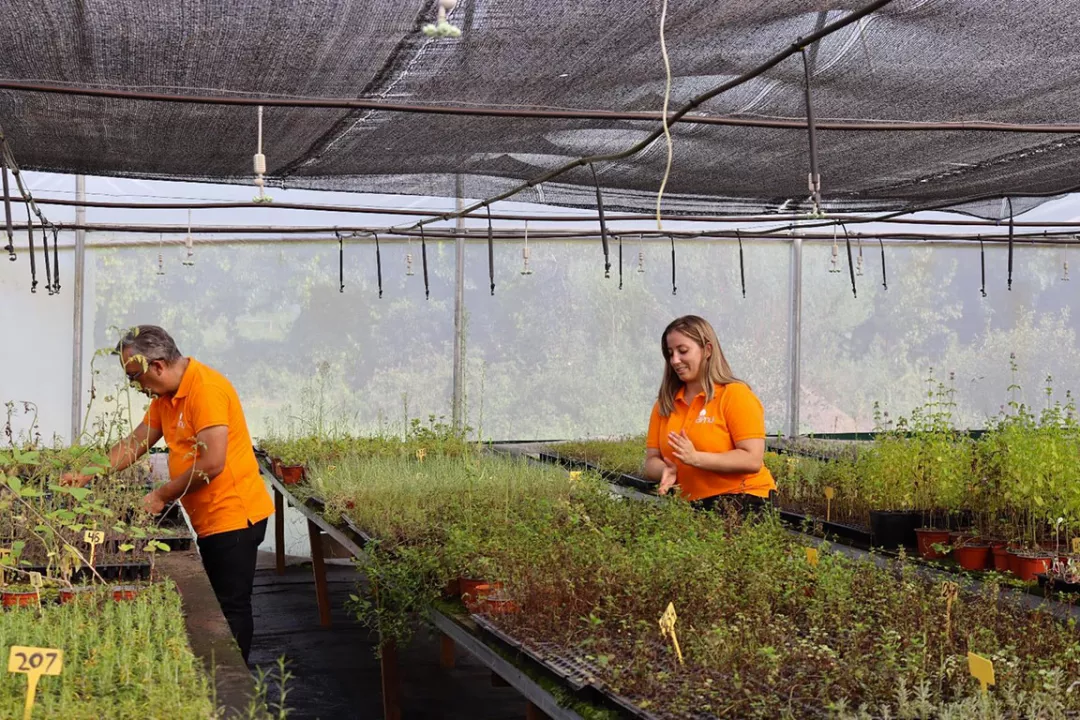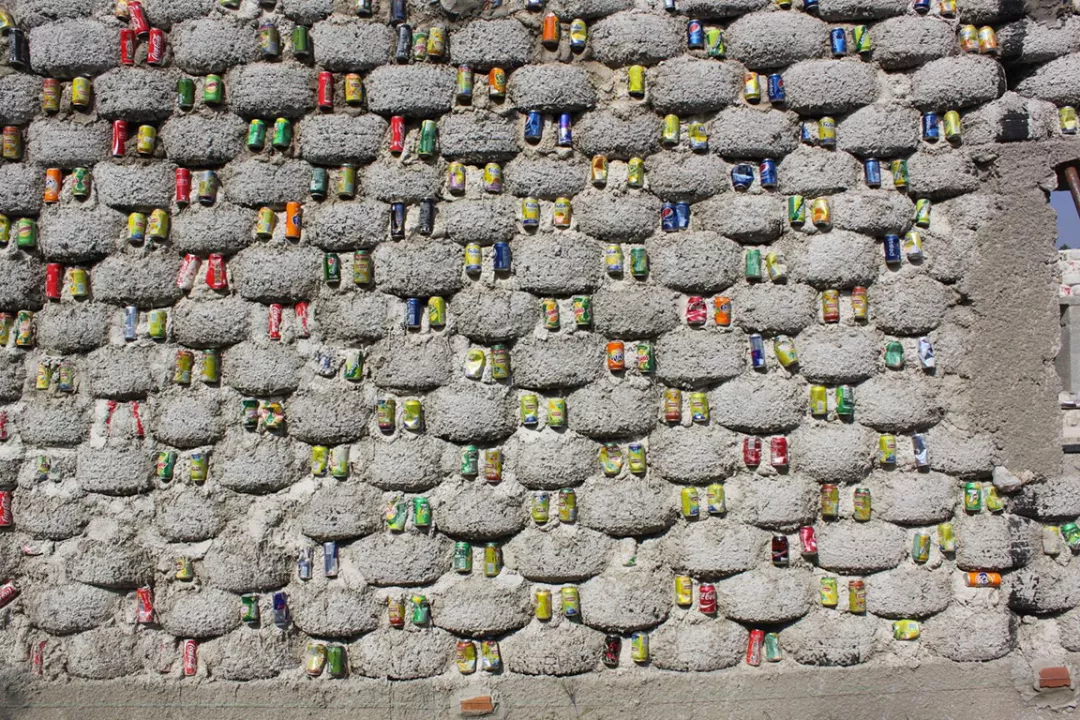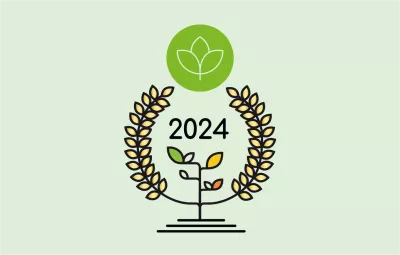General information
RDP Priority
- P5. Resource efficiency and climate
- P6. Social inclusion and local development
RDP Focus Area
- 4B: Water management
- 5B: Energy use efficiency
- 5C: Renewable sources & waste management
- 5E: Carbon conservation & sequestration
- 6B: Local development
RDP Measure
- M04: Investments in physical assets
- M19: LEADER/CLLD
Beneficiary type
- Small-Micro Enterprise
Summary
Utopia Space is a pioneering nationwide project in the field of sustainability and environmental preservation, created by Plako, a technology company which branched out from the village of Póvoa de Lanhoso and acquired an agricultural area of over a hectare. Utopia combines a co-working space with an organic farm, creating a harmonious environment between work and nature. One of the most emblematic milestones is the construction of the main building, featuring 2 200 used tyres, 11 000 soda cans and 75 000 cork stoppers. Integrated into this space, AMU. bio is a certified biological nursery for aromatic and medicinal plants, producing over 90 species, sold exclusively through the online store. It is one of the few nurseries to propagate plants by cuttings with 100% success in all seasons and the only organic producers to produce national varieties such as oregano and rosemary. The commitment to sustainability and innovation attracts national and international visitors, who come to the unique environment of Utopia Space to learn about the plant production processes, try organic infusions and enjoy the cuisine available. The project is the realisation of a dream where technology and agriculture come together to promote a greener and more sustainable future.
Results
- 16% reduction in shipping cost by reusing cardboard boxes obtained from nearby stores.
- Reduction of 20% in water consumption through reuse of rainwater and culture tables which allow humidity to be retained.
- Introduction of soil humidity sensors and a weather station made it possible to improve the management of water used.
- Automation of windows, irrigation and lighting systems in the main building, management of water and energy costs, all use internally developed software.
- 70% reduction in carbon emissions during construction and greater energy efficiency thanks to the width of walls (80 cm), use of cork in walls and landscaped roof (reduction of visual impact on landscape and energy consumption for cooling/heating).
- Creation of five full-time jobs – three women, two men (one Senegalese refugee and one person from a social integration association) – and opening of temporary jobs in the summer season.
- 1 200+ visitors to date.
Ressources
Documents
Context
The project has a strong pedagogical and social awareness character, promoting the reuse of materials, redefinition of workspaces, reactivation of agriculture through organic production and reuse of wastelands.

The Utopia Project, together with AMU.bio, reflect the partners' dreams of raising people's awareness of the urgency of changing habits and ensuring a better planet for future generations.
The project began with support from the Young Farmer Programme, which was fundamental for its implementation and growth. Since 2010, the project mentor Moisés Campos has received more than 500 hours of training in areas such as organic farming and irrigation systems, which laid the foundations for the development of this project.
Aromatic plants have seen an increase in demand since 2014, when production was started. The increase in species through the introduction of Portuguese varieties allowed the nursery to be the only one in the country to propagate and preserve certain varieties (especially Lavandula Stoechas subsp. Luisieri, Origanum vulgare subsp. Virens and Thymus mastichina L. ssp. Mastichina). Since 2022, AMU.bio has been part of certain research projects, including PRR-P2-Resilis, which aims to study alternative practices to the use of pesticides in cherry and peach crops.
Objectives
In the planning and construction phase of the project, the idea was to reduce the ecological (and carbon) footprint through the construction of more sustainable buildings. Once the space had been created, there was a desire to introduce national species that are not commercially sought after, with the aim of preserving them, making them known to the market and increasing their demand through various pedagogical actions.
The project managers sought to establish synergies with local social entities to promote inclusive employment and reduce the local unemployment rate while creating an alternative space for work and leisure with a strong contact with nature.
Overall, the project hoped to boost the area where it was operating, reusing wasteland and widening the spread of organic farming.
Activities

The project traces its origins to 2014 with the installation of a 500m2 greenhouse which enabled the start of propagation of aromatic plants. The AMU.bio online store was also launched that year.
It also marked the beginning of study visits by students and social solidarity institutions from around the country and abroad, guided tours of the space and open-air events. The interest and curiosity on the part of society has been reflected in a gradual increase in visits to the space over the years.
Collections began in 2015 of used tyres to create the walls of the main building, soda cans (via a campaign called 'Give a can to Utopia') involving a large number of restaurants in the municipality, and then cork stoppers, in conjunction with the scouts, with over 75 000 used cork stoppers collected.
The Utopia Space was constructed in 2017, and the process was also an opportunity to raise awareness among national production companies regarding the supply of ceiling wood, wall cork and sanitary ware.
Around that time and through to 2022, the software and hardware (sensors, electro-valves and motors) were developed and improved internally to enable further optimisation of water use, humidity control and energy consumption.
In 2021, a second greenhouse measuring 275m2 was built to increase greenhouse capacity. Seeds were collected from the National Germplasm Bank to propagate indigenous species, and then in 2022, capacity was increased further with a new 500m2 greenhouse, making 1 275m2 of greenhouse space.
Partnerships were set up with the municipality of Póvoa de Lanhoso, as well as local schools and institutions, which resulted in the project’s presence at various events such as fairs, workshops and conferences. A protocol with the municipality's social solidarity institution was also signed to integrate workers with mental disabilities into the project’s nursery.
In 2022, AMU.bio was integrated into a national research project involving polytechnics, research institutes, universities and institutions that seek biological solutions for issues such as weed control in orchards. The following year, the space hosted the National Meeting of Aromatic Plant Producers.
Throughout the project, various sustainability-focused tasks were carried out, such as the separation of waste, recycling, the recovery of organic materials for composting (used as natural fertiliser in the nursery), the reuse of rainwater and the use of solar energy. These and the project’s primary activities enabled the creation of five new full-time jobs.
Main results
Participation in events and partnerships with various other bodies has resulted in a greater ability to attract human resources, offsetting the seasonality of production and impacts on the workforce. Five full-time jobs have been created, with three women taken on and two men – one a Senegalese refugee, the other via a social solidarity and insertion association. A number of temporary jobs have also been created in the summer season, which is much busier. To date, the project has welcomed over 1 200 visitors.
Various costs – literally and in terms of impact on the environment – were reduced. Shipping costs were brought down by 16% by reusing cardboard boxes obtained from nearby stores while water consumption went down over 20% via the reuse of rainwater and culture tables, which allow humidity to be retained. The introduction of soil humidity sensors and a weather station also made it possible to improve the management of the water used.
The automation of the windows, the irrigation and lighting systems in the main building, and the management of water and energy costs were done via internally developed software. The structure of the building also played a role, with a 70% reduction in carbon emissions during construction and greater energy efficiency thanks to the (80 cm) width of the walls, the use of cork in the walls and the landscaped roof (which reduced the visual impact on the landscape and the energy consumed for cooling and heating).
Key lessons
The Utopia Space project has proven that even micro and small companies can carry out projects to reduce their ecological footprint and have a very positive impact on society. This may include obstacles to overcome – constructing buildings using used tyres, for example, was an enormous challenge, full of difficulties and surprises during the years of construction.
The project also illustrated that investing in rural areas and moving away from large urban centres can be synonymous with increased productivity, quality of life and work, and economic growth, all while respecting the environment.
Contacts
Andreia Costa


